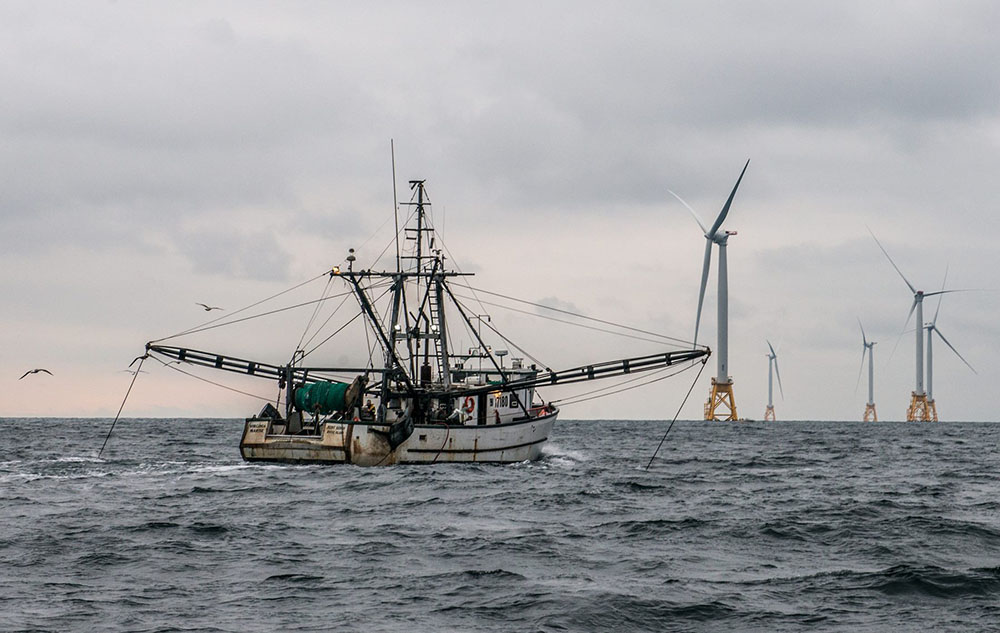Nine East Coast states put out a call for potentially creating a regional administrator for fisheries compensation and mitigation from offshore wind development, with fishing industry advocates calling for “an equitable and appropriate compensation strategy” from Maine to Virginia
“Recognizing the importance of sustaining a vibrant fishing community that can coexist and thrive alongside offshore wind energy development, the states have released a Request for Information (RFI) aimed at receiving input from impacted members of the fishing industry, offshore wind developers, corporate and financial management entities, as well as interested members of the public, to inform efforts to establish a regional fisheries compensatory mitigation fund administrator,” according to a joint Dec. 12 announcement.
The RFI from Maine, New Hampshire, Massachusetts, Rhode Island, Connecticut, New York, New Jersey, Maryland and Virginia follows on the federal Bureau of Ocean Energy Management issuing its June 2022 draft framework for mitigating impacts to commercial and recreational fisheries.
The states – organized as the Special Initiative on Offshore Wind – say they aim for a mitigation system that will work “in a fair, equitable, and transparent manner for impacted Atlantic Coast fishing industry members and offshore wind developers.” The request seeks public feedback on “how to best establish a single regional administrator for the Atlantic Coast to collect, hold, determine eligibility, and dispense funds for economic losses to affected fishing industry members.”
The request for information comes as BOEM released draft environmental impact statements for the Coastal Virginia Offshore Wind (CVOW) project 24 nautical miles east of Virginia Beach, and the Sunrise Wind project 26.5 miles east of Montauk, N.Y. Together the two projects would have a maximum nameplate capacity up to 4,034 megawatts, according to BOEM.
The draft environmental impact statements will be published in the Dec. 16 Federal Register, starting a 60-day public comment period until Feb. 14. Findings from the EIS process will figure into agency approval of the construction and operations plans for CVOW and Sunrise Wind – and what mitigation measures BOEM will require of developers.
Those projects are respectively the fourth and fifth U.S. offshore wind projects now in that stage of regulatory review; BOEM has approved the first two commercial scale offshore wind projects with Vineyard Wind and South Fork Wind Farm and has reviews started on 10 additional projects.
The RFI and an accompanying scoping document were prepared with input from representatives of both the fishing and offshore wind industries, including the Responsible Offshore Development Alliance, (RODA) a coalition of fishermen, fishing businesses and communities, say organizers. Responses to the RFI are due Jan. 31.
Virginia is working with RODA and put out a joint statement Tuesday in support of the regional administrator concept.
“As providers of sustainable seafood, our members are deeply invested in protecting U.S. fisheries and are grateful to the Commonwealth of Virginia for the opportunity to participate in initial discussions of this state-led effort. It is essential that impacted parties have a central role in designing and administering strategies that will most effectively mitigate impacts of offshore wind, and we look forward to continuing to refine an equitable and appropriate compensation strategy,” said Lane Johnston, programs manager at RODA.
“The commercial fishing community are stewards of their resources and we as Virginians have a responsibility to ensure their equities are considered as we embrace an all-of-the-above energy plan that includes offshore wind. Our goal to ensure the Commonwealth has a reliable, affordable, clean and growing supply of power can be possible while protecting the jobs of our important fishing industry,” said Travis Voyles, Virginia’s acting Secretary of Natural and Historic Resources.




